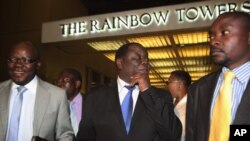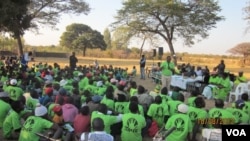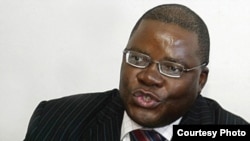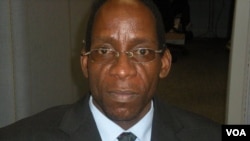HARARE —
President Robert Mugabe has declared that elections will be held July 31st, 2013, following a recent constitutional court ruling that polls be held before the end of next month.
Prime Minister Morgan Tsvangirai, Mr. Mugabe’s partner in the coalition government, immediately said Thursday he would not accept the date. The Movement for Democratic Change leader challenged Mugabe's actions as “unconstitutional.”
In order to proclaim the date, the president first fast-tracked changes to electoral laws agreed on by all political parties in cabinet on Tuesday. Mugabe used a presidential decree to bypass Parliament.
In an official government notice defending the action, Mugabe said, “Given the deadline imposed by the constitutional court, it became inexpedient to await the passage through Parliament of the electoral amendment bill to align the electoral law with the new constitution.”
Among other things, the amended electoral laws ensure that all political parties have access to ZBC, the state broadcaster, and that elections results of will be posted outside polling centres.
Another “Illegitimate Election”?
In an MDC statement, Mr. Tsvangarai said Mugabe’s unilateral actions create “a situation where Zimbabweans will yet again be railroaded and frog-marched into another illegitimate and violent election.”
The MDC accuses the president of circumventing Parliament and bypassing the gazetting requirements.
Citing the Global Political Agreement (GPA), signed in September 2008 to resolve the violently disputed election that year, Tsvangirai said the president can only make an executive decision of this kind in consultation with the prime minister.
“Thus,” the prime minister said, “President Mugabe’s actions are a unilateral and flagrant breach of our constitution and the GPA. I, as prime minister, cannot and will not accept this.”
Tsvangirai also cited other legal impediments to a July 31st election date. “Moreover,” he said, “part three of the sixth schedule of our constitution makes it clear that there shall be an intense 30-day voter registration exercise. Only on Tuesday in cabinet all political parties agreed that [the current voter registration exercise] had commenced on 10 June 2013 and it would be completed on 9th July 2013. The net effect of the proclamation is, therefore, to infringe on the constitutional provisions obliging the intense 30-day voter registration exercise. It will also mean that President Mugabe is disenfranchising many people who are registering to vote—for instance, the so-called aliens and first-time voters. President Mugabe also denied political parties and Zimbabweans the opportunity to inspect the voters’ roll. In any event, section 26A of our electoral act chapter 2, subsection 13, makes it clear that voter registration for everyone closes 24 hours before the seating of the nomination court. This means that voter registration will now close on the 27th of June 2013 instead of 9th July 2013, a clear, flagrant, and fraudulent breach of our constitution.”
Tsvangirai expressed concern that many voters, particularly first-time voters and “so-called alien” voters, may be disenfranchised by any disruption to the full 30-day registration exercise.
Presidential Powers Still Part of Legislation
Zanu-PF Member of Parliament and former COPAC co-chairman, Munyaradzi Paul Mangwana defended President Mugabe’s declaration of the election date today, saying he followed the constitution.
“First of all,” Mr. Mangwana said, “let me remind those who are making those claims that if they read the transition mechanism in the new constitution, those mechanisms ensure that every law which was existing at the time the new constitution became law remains in force until declared otherwise by the constitutional court. Therefore the presidential powers act is still part of our legislation. The president has simply invoked his powers in terms of the presidential powers act, which is the law exactly right now. So the president is acting legally. That’s number one. Secondly, if you read the chapter on the legislature in the new constitution, it clearly stipulates that legislative power rests in both Parliament and the president. So the president has got legislative power granted to him in terms of the new constitution which was voted into law. Therefore the president is acting legally and constitutionally.”
When asked to respond to Tsvangirai’s claim that the president did not consult the prime minister in making the decision, Mangwana said, “There is only one president in Zimbabwe and that is President Mugabe. Mr. Tsvangirai is nowhere near being a president. Therefore, you must understand that the GPA does not override the new constitution. It is the GPA which required him to be consulted. But the new constitution does not require the president to consult him.”
Poking SADC in the Eye?
The declaration of the election date comes only two days before a Southern African Development Community (SADC) summit to discuss Zimbabwe’s election roadmap and the funding of the polls. The summit is set for Maputo, Mozambique, this Saturday.
Saying that the declaration may be Zanu-PF’s attempt to limit SADC’s options, Priscilla Misiharabwi Mushonga, General Secretary of the MDC formation of Industry Minister Welshman Ncube, told Studio 7 that her party was “shocked” by President Mugabe’s declaration of the election date, especially after cabinet had agreed Tuesday on a consultation process.
“Well,” Ms. Mushonga said, “we are still doing internal consultations within the party, so will then issue a statement after that, but the preliminary statement is that we are very disappointed. More so because you cannot work with colleagues who basically are so dishonest. We were together in cabinet on Tuesday. The honorable [Justice Minister Patrick] Chinamasa in that cabinet indicated to us in very clear terms the electoral bill would only be brought to Parliament next week. In the meantime he knew that he had already done the draft, basically using the presidential powers. Let alone the whole issue that we had the delay of the summit under the pretext that they were going to be consulted, when in fact they wanted to go with the proclamation, sot that SADC would not then have a way of dealing with the Zimbabwe issue. So really the whole thing has been just deceitful.”
Mushonga says she expects today’s events will spark heated discussions in Maputo among regional leaders at the SADC summit. “Well, secondly,” she said, “we are going there quite disgusted, so it is going to be a very difficult summit because we are starting on a position of dealing with people that behave like, eh, fraud.”
No Money for Elections
Regardless of the date, a critical question remains: how will the elections be paid for?
Zimbabwe Electoral Commission (ZEC) chairperson Rita Makarau today told the parliamentary committee on security and defense that the electoral body is “ready” for the elections, though she did warn the committee that ZEC requires resources to run a credible poll.
Finance minister Tendai Biti told Studio 7 that Harare has no money to hold the elections.
“In respect of the current election and the voter registration exercise,” Mr. Biti said, “we begged, borrowed $25 million US, which we had reserved for the voter registration exercise as defined by part 3, schedule 6 of the constitution of Zimbabwe. But as far as the election is concerned, we don’t even have a single cent. Let me repeat: we don’t even have a single cent. We are going to require money to purchase ink, money to purchase ballot papers, money to construct or buy or build polling stations, money to buy police equipment that will be used for elections, including vehicles. We’re going to need money to pay those people who are going to run the elections, the presiding officers. We are going to need money in respect of logistics around the election—generators and so forth. This is approximately $120 million US. We have written to SADC, we have written to the UN, we have written to key influential countries in the SADC region—the Republic of South Africa, the Republic of Angola, the Republic of Botswana. We have not even had acknowledgement of receipt, except the letter we wrote to South Africa [Finance Minister] Pravin [Gordhan] office. His private secretary is the one who wrote to us and said, ‘I acknowledgement receipt; I’ll come back to you.’ So to put it shortly, but very clearly and unambiguously, Zimbabwe doesn’t have a cent for the election.”
Legal Steps
Mr. Tsvangirai said he is now taking legal action against Mr. Mugabe’s proclamation.
“I have clearly reflected on this matter and this morning, to defend the constitution, which I’ve sworn to do, I’ve instructed my attorneys to file and urgent application to deal with this matter. In addition, I’ll be leaving tomorrow for SADC and I will fully brief the regional leaders on the crisis in Zimbabwe,” he said.
Meanwhile, the constitutional court has postponed indefinitely a case brought by one Tavengwa Bukaibenyu, who is seeking an order compelling Harare to allow Zimbabweans in the diaspora to participate in the country’s electoral processes. Chief Justice Godfrey Chidyausiku said the court was waiting for the passage of new electoral laws that were later gazetted by the president so the court could make an informed decision.
“Mugabe’s Constitution”
Other leaders are likely to support Tsvangirai in his efforts. Democratic Party leader Urayayi Zembe said the unilateral declaration of the election date by President Mugabe damages the credibility of the polls, especially in the absence of key democratic reforms.
“Because there is nothing on the ground,” Mr. Zembe said. “There is total disagreement, even among the GPA partners. Worse, when it comes to the open society where we belong, we totally disagree with the constitutional framework, we totally disagree with the unpreparedness. We totally disagree with the fact that there’s been huge defects, yet the nation is being told it’s a people-driven constitution. Yet it is the 20th amendment of the Lancaster House, Mugabe’s constitution, now. It’s Mugabe’s GPA. So really what we have is the GPA constitution and we know that it is Mugabe who has total power in terms of that arrangement. Within the GPA it is the 20th amendment. So definitely we’re going to have a huge and very serious disagreement in the country, but we are going to have a messed up sort of talk at the election which is going to cause another bloodbath.”
National Constitutional Assembly chairman Lovemore Madhuku, a constitutional law expert, says Mr. Mugabe acted within the confines of the law, but says the law provides the president with too much power.
“Remember,” Mr. Madhuku said, “we were opposing the constitution that is now the constitution of the country. They left the president with all the powers that the president had in the previous const. This is now proving what we were saying, that the president has been left with so much power. And if they say let them go to the cons court and let the constitutional court say that the president has usurped because the rule is that if the thing is enacted unlawfully—the process is very clear—they must go to the cons court which they established under the const. That court will tell the country and everyone whether what the president did was within the constitution or not. I have no doubt myself that the court will say that the president acted in accordance with the constitution which these people put in place. They left the president with so much power.”
Former Zanu-PF MP, now Zapu leader, Dumiso Dabengwa expressed disappointment with Mugabe’s decision, saying the president “should have at least been able to listen to the views that were expressed by the other parties, particularly the views that were expressed under the…coalition views that we expressed together with the other two parties that are in government. And that he should have not only gone by the court ruling. Like we said, he has done it before. When it came to the by-elections, because he did not want the by-elections, he was able to wrangle his way out. It is very clear that this was a deliberate to petition the Supreme Court, which they knew was going to respond favorably to their antics and they decided to go by what the ruling court said.”
Prime Minister Morgan Tsvangirai, Mr. Mugabe’s partner in the coalition government, immediately said Thursday he would not accept the date. The Movement for Democratic Change leader challenged Mugabe's actions as “unconstitutional.”
In order to proclaim the date, the president first fast-tracked changes to electoral laws agreed on by all political parties in cabinet on Tuesday. Mugabe used a presidential decree to bypass Parliament.
In an official government notice defending the action, Mugabe said, “Given the deadline imposed by the constitutional court, it became inexpedient to await the passage through Parliament of the electoral amendment bill to align the electoral law with the new constitution.”
Among other things, the amended electoral laws ensure that all political parties have access to ZBC, the state broadcaster, and that elections results of will be posted outside polling centres.
Another “Illegitimate Election”?
In an MDC statement, Mr. Tsvangarai said Mugabe’s unilateral actions create “a situation where Zimbabweans will yet again be railroaded and frog-marched into another illegitimate and violent election.”
The MDC accuses the president of circumventing Parliament and bypassing the gazetting requirements.
Citing the Global Political Agreement (GPA), signed in September 2008 to resolve the violently disputed election that year, Tsvangirai said the president can only make an executive decision of this kind in consultation with the prime minister.
“Thus,” the prime minister said, “President Mugabe’s actions are a unilateral and flagrant breach of our constitution and the GPA. I, as prime minister, cannot and will not accept this.”
Tsvangirai also cited other legal impediments to a July 31st election date. “Moreover,” he said, “part three of the sixth schedule of our constitution makes it clear that there shall be an intense 30-day voter registration exercise. Only on Tuesday in cabinet all political parties agreed that [the current voter registration exercise] had commenced on 10 June 2013 and it would be completed on 9th July 2013. The net effect of the proclamation is, therefore, to infringe on the constitutional provisions obliging the intense 30-day voter registration exercise. It will also mean that President Mugabe is disenfranchising many people who are registering to vote—for instance, the so-called aliens and first-time voters. President Mugabe also denied political parties and Zimbabweans the opportunity to inspect the voters’ roll. In any event, section 26A of our electoral act chapter 2, subsection 13, makes it clear that voter registration for everyone closes 24 hours before the seating of the nomination court. This means that voter registration will now close on the 27th of June 2013 instead of 9th July 2013, a clear, flagrant, and fraudulent breach of our constitution.”
Tsvangirai expressed concern that many voters, particularly first-time voters and “so-called alien” voters, may be disenfranchised by any disruption to the full 30-day registration exercise.
Presidential Powers Still Part of Legislation
Zanu-PF Member of Parliament and former COPAC co-chairman, Munyaradzi Paul Mangwana defended President Mugabe’s declaration of the election date today, saying he followed the constitution.
“First of all,” Mr. Mangwana said, “let me remind those who are making those claims that if they read the transition mechanism in the new constitution, those mechanisms ensure that every law which was existing at the time the new constitution became law remains in force until declared otherwise by the constitutional court. Therefore the presidential powers act is still part of our legislation. The president has simply invoked his powers in terms of the presidential powers act, which is the law exactly right now. So the president is acting legally. That’s number one. Secondly, if you read the chapter on the legislature in the new constitution, it clearly stipulates that legislative power rests in both Parliament and the president. So the president has got legislative power granted to him in terms of the new constitution which was voted into law. Therefore the president is acting legally and constitutionally.”
When asked to respond to Tsvangirai’s claim that the president did not consult the prime minister in making the decision, Mangwana said, “There is only one president in Zimbabwe and that is President Mugabe. Mr. Tsvangirai is nowhere near being a president. Therefore, you must understand that the GPA does not override the new constitution. It is the GPA which required him to be consulted. But the new constitution does not require the president to consult him.”
Poking SADC in the Eye?
The declaration of the election date comes only two days before a Southern African Development Community (SADC) summit to discuss Zimbabwe’s election roadmap and the funding of the polls. The summit is set for Maputo, Mozambique, this Saturday.
Saying that the declaration may be Zanu-PF’s attempt to limit SADC’s options, Priscilla Misiharabwi Mushonga, General Secretary of the MDC formation of Industry Minister Welshman Ncube, told Studio 7 that her party was “shocked” by President Mugabe’s declaration of the election date, especially after cabinet had agreed Tuesday on a consultation process.
“Well,” Ms. Mushonga said, “we are still doing internal consultations within the party, so will then issue a statement after that, but the preliminary statement is that we are very disappointed. More so because you cannot work with colleagues who basically are so dishonest. We were together in cabinet on Tuesday. The honorable [Justice Minister Patrick] Chinamasa in that cabinet indicated to us in very clear terms the electoral bill would only be brought to Parliament next week. In the meantime he knew that he had already done the draft, basically using the presidential powers. Let alone the whole issue that we had the delay of the summit under the pretext that they were going to be consulted, when in fact they wanted to go with the proclamation, sot that SADC would not then have a way of dealing with the Zimbabwe issue. So really the whole thing has been just deceitful.”
Mushonga says she expects today’s events will spark heated discussions in Maputo among regional leaders at the SADC summit. “Well, secondly,” she said, “we are going there quite disgusted, so it is going to be a very difficult summit because we are starting on a position of dealing with people that behave like, eh, fraud.”
No Money for Elections
Regardless of the date, a critical question remains: how will the elections be paid for?
Zimbabwe Electoral Commission (ZEC) chairperson Rita Makarau today told the parliamentary committee on security and defense that the electoral body is “ready” for the elections, though she did warn the committee that ZEC requires resources to run a credible poll.
Finance minister Tendai Biti told Studio 7 that Harare has no money to hold the elections.
“In respect of the current election and the voter registration exercise,” Mr. Biti said, “we begged, borrowed $25 million US, which we had reserved for the voter registration exercise as defined by part 3, schedule 6 of the constitution of Zimbabwe. But as far as the election is concerned, we don’t even have a single cent. Let me repeat: we don’t even have a single cent. We are going to require money to purchase ink, money to purchase ballot papers, money to construct or buy or build polling stations, money to buy police equipment that will be used for elections, including vehicles. We’re going to need money to pay those people who are going to run the elections, the presiding officers. We are going to need money in respect of logistics around the election—generators and so forth. This is approximately $120 million US. We have written to SADC, we have written to the UN, we have written to key influential countries in the SADC region—the Republic of South Africa, the Republic of Angola, the Republic of Botswana. We have not even had acknowledgement of receipt, except the letter we wrote to South Africa [Finance Minister] Pravin [Gordhan] office. His private secretary is the one who wrote to us and said, ‘I acknowledgement receipt; I’ll come back to you.’ So to put it shortly, but very clearly and unambiguously, Zimbabwe doesn’t have a cent for the election.”
Legal Steps
Mr. Tsvangirai said he is now taking legal action against Mr. Mugabe’s proclamation.
“I have clearly reflected on this matter and this morning, to defend the constitution, which I’ve sworn to do, I’ve instructed my attorneys to file and urgent application to deal with this matter. In addition, I’ll be leaving tomorrow for SADC and I will fully brief the regional leaders on the crisis in Zimbabwe,” he said.
Meanwhile, the constitutional court has postponed indefinitely a case brought by one Tavengwa Bukaibenyu, who is seeking an order compelling Harare to allow Zimbabweans in the diaspora to participate in the country’s electoral processes. Chief Justice Godfrey Chidyausiku said the court was waiting for the passage of new electoral laws that were later gazetted by the president so the court could make an informed decision.
“Mugabe’s Constitution”
Other leaders are likely to support Tsvangirai in his efforts. Democratic Party leader Urayayi Zembe said the unilateral declaration of the election date by President Mugabe damages the credibility of the polls, especially in the absence of key democratic reforms.
“Because there is nothing on the ground,” Mr. Zembe said. “There is total disagreement, even among the GPA partners. Worse, when it comes to the open society where we belong, we totally disagree with the constitutional framework, we totally disagree with the unpreparedness. We totally disagree with the fact that there’s been huge defects, yet the nation is being told it’s a people-driven constitution. Yet it is the 20th amendment of the Lancaster House, Mugabe’s constitution, now. It’s Mugabe’s GPA. So really what we have is the GPA constitution and we know that it is Mugabe who has total power in terms of that arrangement. Within the GPA it is the 20th amendment. So definitely we’re going to have a huge and very serious disagreement in the country, but we are going to have a messed up sort of talk at the election which is going to cause another bloodbath.”
National Constitutional Assembly chairman Lovemore Madhuku, a constitutional law expert, says Mr. Mugabe acted within the confines of the law, but says the law provides the president with too much power.
“Remember,” Mr. Madhuku said, “we were opposing the constitution that is now the constitution of the country. They left the president with all the powers that the president had in the previous const. This is now proving what we were saying, that the president has been left with so much power. And if they say let them go to the cons court and let the constitutional court say that the president has usurped because the rule is that if the thing is enacted unlawfully—the process is very clear—they must go to the cons court which they established under the const. That court will tell the country and everyone whether what the president did was within the constitution or not. I have no doubt myself that the court will say that the president acted in accordance with the constitution which these people put in place. They left the president with so much power.”
Former Zanu-PF MP, now Zapu leader, Dumiso Dabengwa expressed disappointment with Mugabe’s decision, saying the president “should have at least been able to listen to the views that were expressed by the other parties, particularly the views that were expressed under the…coalition views that we expressed together with the other two parties that are in government. And that he should have not only gone by the court ruling. Like we said, he has done it before. When it came to the by-elections, because he did not want the by-elections, he was able to wrangle his way out. It is very clear that this was a deliberate to petition the Supreme Court, which they knew was going to respond favorably to their antics and they decided to go by what the ruling court said.”

















